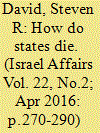| Srl | Item |
| 1 |
ID:
144671


|
|
|
|
|
| Summary/Abstract |
Israel is one of the only countries whose continued existence is called into question. The history of state death and particularly the record of state death since the end of the Cold War provide insights into the kinds of threats that are most likely to bring about the demise of countries in the twenty-first century, including Israel. This record suggests that armed conquest is no longer a principal danger to countries. Instead, state death is more likely to arise by a peaceful decision to end the state. The reasons for this decision vary case by case, but changes in the policy of a great power, ethnic strife, and a growing belief in the illegitimacy of the country’s right to exist have all played key roles in recent state deaths. Israel struggles with each of these issues, making the lessons of state death especially relevant for its future. By learning from the experience of state deaths, Israel can best assess its own vulnerabilities and determine what it needs to do to maximize its prospects for survival.
|
|
|
|
|
|
|
|
|
|
|
|
|
|
|
|
| 2 |
ID:
116866


|
|
|
|
|
| Publication |
2012.
|
| Summary/Abstract |
State death, understood as the formal loss of control over foreign policy, is an important but neglected issue in the international relations literature. When do states die and why? How do states exit the system? The consequences of state death can be wide-ranging, from forced migration movements, regional instability, to general famine. Despite these severe consequences, political scientists have yet to adequately study the causes of state death. Fazal finds that states are prone to death when they are located as a buffer between two rivals; this suggests that being a buffer state is a cause of state death. Our expansion of current research seeks to add the concept of territorial disputes to the state death literature. We suggest that states are at greater risk of death when they become involved in territorial disputes that raise the stakes of conflict. The resulting research demonstrates that a reliable predictor of state death is engagement in a territorial dispute. Territorial disputes are the most prevalent issue that leads to war and can also be a leading cause of state death.
|
|
|
|
|
|
|
|
|
|
|
|
|
|
|
|